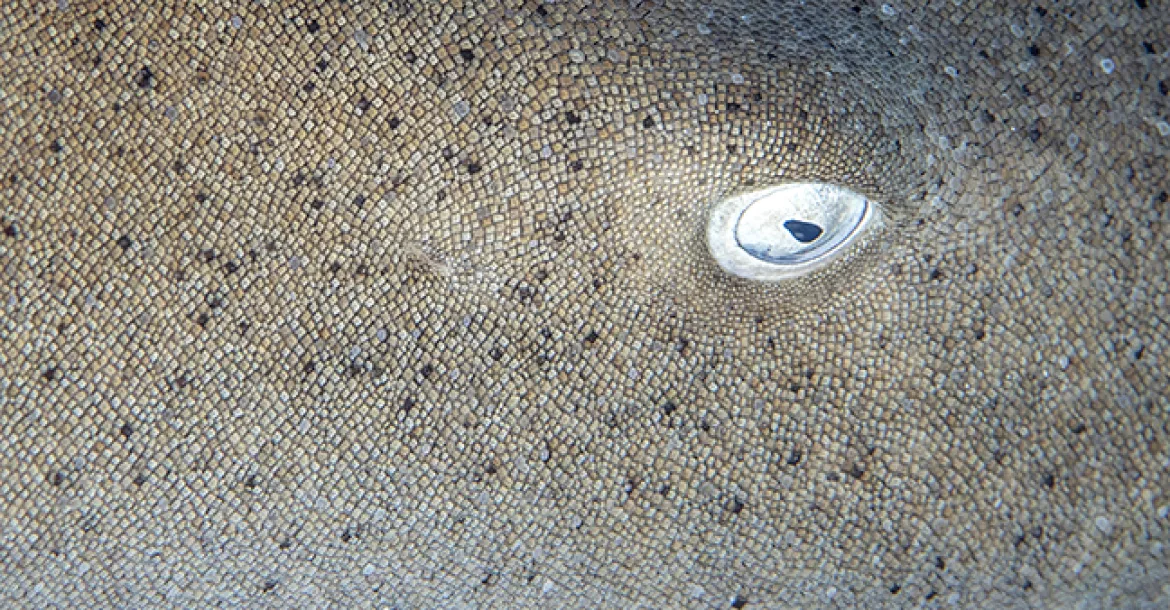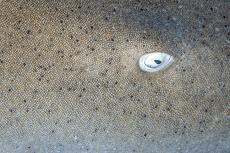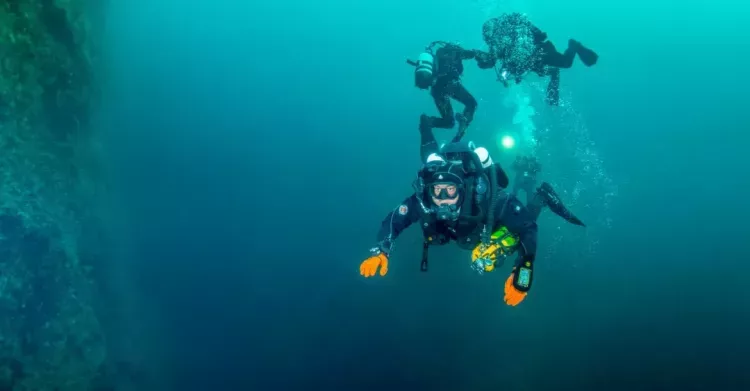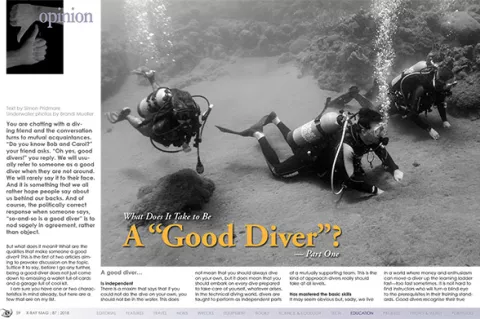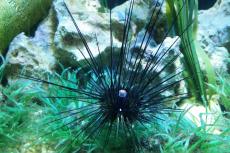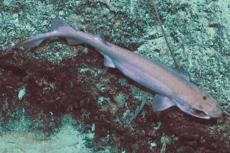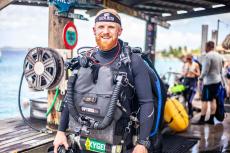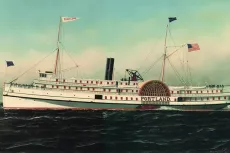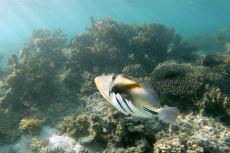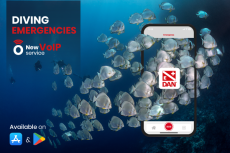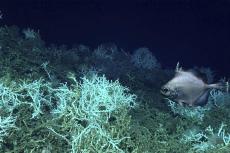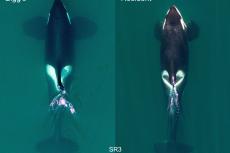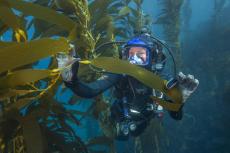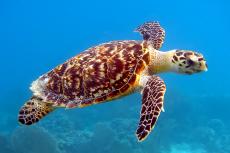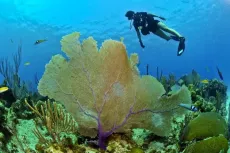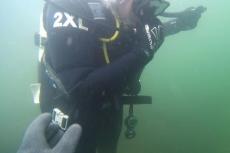You are chatting with a diving friend and the conversation turns to mutual acquaintances. “Do you know Bob and Carol?” your friend asks. “Oh yes, good divers!” you reply. We will usually refer to someone as a good diver when they are not around. We will rarely say it to their face. And it is something that we all rather hope people say about us behind our backs. And of course, the politically correct response when someone says, “so-and-so is a good diver” is to nod sagely in agreement, rather than object. But what does it mean? What are the qualities that make someone a good diver?
Contributed by
Factfile
Simon Pridmore is the author of the international bestsellers, Scuba Confidential: An Insider's Guide to Becoming a Better Diver, Scuba Professional: Insights into Sport Diver Training & Operations and Scuba Fundamental: Start Diving the Right Way.
He is also the co-author of Diving & Snorkeling guides to Bali and Raja Ampat & Northeast Indonesia and a new adventure travelogue called Under the Flight Path.
He recently published two new books, Scuba Physiological: Think you Know All About Scuba Medicine? Think Again! and Dining with Divers: Tales from the Kitchen Table.
For more information, see his website at: SimonPridmore.com.
This is the first of two articles aiming to provoke discussion on the topic. Suffice it to say, before I go any further, being a good diver does not just come down to amassing a wallet full of cards and a garage full of cool kit. I am sure you have one or two characteristics in mind already, but here are a few that are on my list.
A good diver…
Is independent
There is a maxim that says that if you could not do the dive on your own, you should not be in the water. This does not mean that you should always dive on your own, but it does mean that you should embark on every dive prepared to take care of yourself, whatever arises. In the technical diving world, divers are taught to perform as independent parts of a mutually supporting team. This is the kind of approach divers really should take at all levels.
Has mastered the basic skills
It may seem obvious but, sadly, we live in a world where money and enthusiasm can move a diver up the learning ladder fast—too fast sometimes. It is not hard to find instructors who will turn a blind eye to the prerequisites in their training standards. Good divers recognise their true abilities and take their time mastering skills at one level before moving on to the next.
Exercises self-discipline
Good divers adopt a disciplined approach to their diving. If there is a plan, they stick to it and they always make sure they have a plan. Experienced divers might claim they do not need a dive plan, but they still have one. It is just ingrained in their DNA, rather than written on a slate. The advent of technical diving, especially rebreather diving, has further reinforced the importance of preparation and planning for successful scuba dives.
Is meticulous
Divers who do not prepare adequately and regularly jump in without turning their air on or without attaching their BCD to the cylinder properly are unlikely to be spoken of by others in glowing terms. Rest assured, if this is you, you do not have to worry about people referring to you as a good diver behind your back.
Is environmentally aware
Good divers are always aware of the impact they can have on the marine environment and act to minimise the adverse effects of their presence there. They do this by maintaining good buoyancy and control skills to ensure they do not come into contact with marine growth or habitats. They also refrain from touching or interfering with marine life, ensure that they wear ocean-friendly sunscreen and produce as little trash as possible, knowing that much of the rubbish we generate ends up in the ocean.
Is considerate
Good divers are spatially aware. They know where other divers are on the beach, in the boat, on the surface and underwater and give them room. They also respect other divers, no matter how much experience they themselves have.
Is conservative
Good divers dive conservatively, making sure that they add safety factors to the dive plan whenever they can. They know that any item of equipment can fail, and that if a piece of kit is essential to the successful completion of a dive, they would do well to have a second one or a viable backup plan. Good divers know that dive computers are limited in their ability to assess the risk of decompression sickness, so they never just follow the computer blindly and always give themselves buffers or cushions. They understand that a computer cannot predict decompression sickness risk accurately, primarily because it does not have access to some of the necessary information—information such as the diver’s level of hydration, physical fitness and surface activity between dives.
Takes health issues seriously
The diving population in Europe and America is ageing and gaining weight. Heart attack is becoming an increasingly common cause of diver death, and the victims of fatal diving incidents are often overweight. Although it is true that our sport does not require that participants be fit, athletic and built like racing whippets, nevertheless a good diver stays in good physiological and physical shape.
This involves following a basic fitness regime, getting regular medical checkups, being aware of one’s limitations and not diving if one becomes ill, injured, incapacitated or has recently had significant surgery. As we do more diving, we gain in experience, but no matter how much we learn, the laws of nature still apply. As our bodies age, they become weaker, we become more susceptible to ailments and our chances of dodging a physiological bullet decrease. When good divers do not feel right, they do not dive.
Does not take shortcuts
As the cliché goes, familiarity breeds contempt. Complacency in diving is often the counterbalance to experience. The problem is that we are human, and by our very nature, we are always looking for an easier way to do things. This is one of the primary drivers that generate progress in our species.
Fear is another primary driver, and when we start diving, fear is a key motivator that makes us more careful and keeps us safe. But the more dives we make without incident, the less we fear, the more we become convinced that the risks are smaller than we thought and the greater is the temptation to make life easier for ourselves.
We start asking ourselves questions like: “Do we really need a spare light on a night dive when the main light has never failed?” and “Why shouldn’t I do my second dive on a partially full cylinder? It’s only shallow.” I am sure you can think of many more examples.
All of us reach the point where these thoughts bubble up from the deepest reaches of our consciousness. Good divers resist them and send them back down where they came from.
Resists peer pressure
Good divers resist other forms of pressure too. Pressure can come from a variety of sources. Some are obvious; others are not. One of the levers that can affect divers and cause them to change the way they dive is peer pressure.
Sometimes this is exerted directly—for instance, when someone lays down a challenge. Other times, it is merely perceived. In either case, it can be powerful enough to lead a diver to take unnecessary risks. The history of scuba diving includes a number of tales of divers who went beyond their comfort zone, dived beyond their limits and took unnecessary risks in order to prove something to themselves or others, and ended up getting hurt or worse.
Sometimes says “No!”
Everyone knows that it is not wise to dive if you are feeling unwell or tired, but it can be hard to sit out a dive when you are part of a group. It is even harder when you are one of a group of two and your refusal has an adverse impact on your buddy’s dive. Good divers know that they are doing nobody any favours if they press ahead with a dive despite the fact that they do not feel well, as a sudden medical emergency or lack of concentration through fatigue can put the safety of the whole team at risk. Of course, good divers also do their utmost to prevent ill health or fatigue affecting their dive plans, but sometimes such things are not easily controlled.
In the next issue of X-Ray Mag, I will continue this theme with a few more of the characteristics that make a good diver. ■

